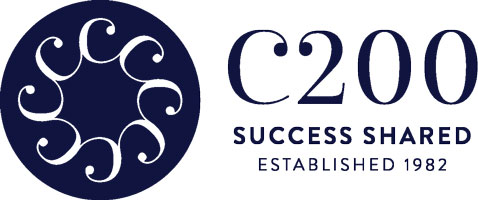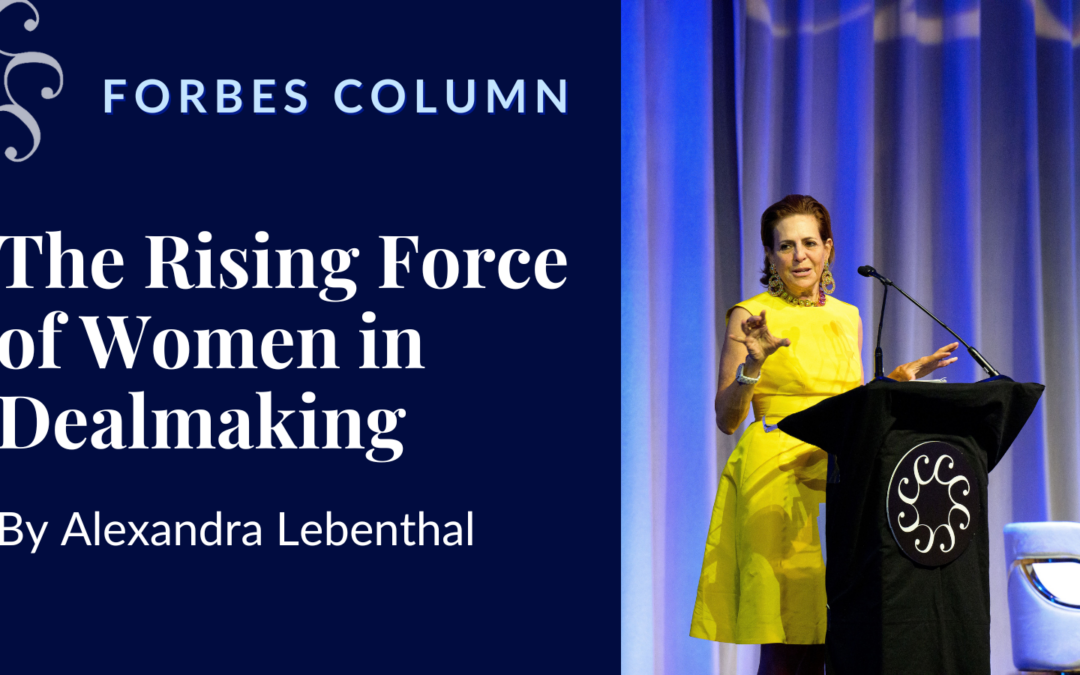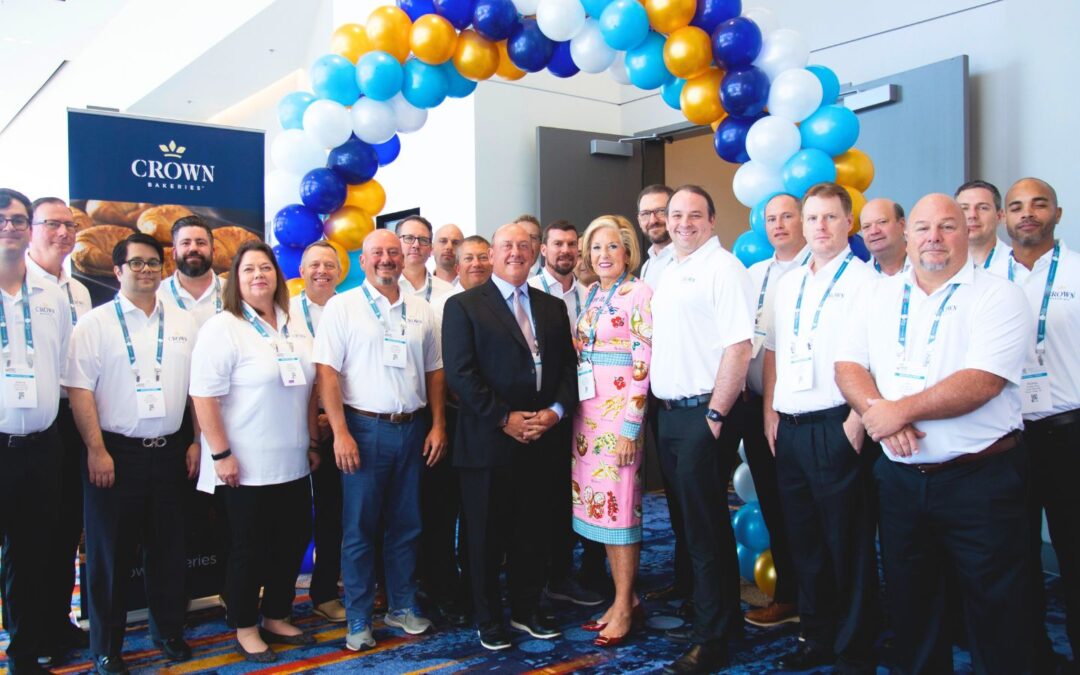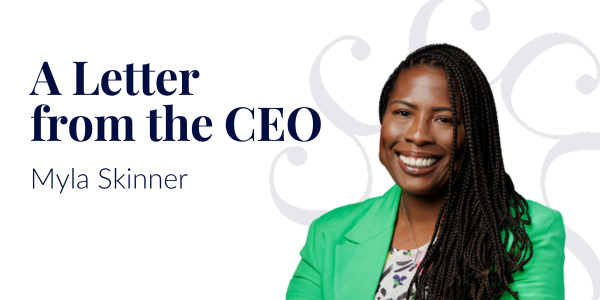
by Eva Glassman | Dec 23, 2024 | Blog, Featured
Dear C200 Community,
It has been an incredible 2024. I’m so grateful for the community that surrounds this organization and our mission to advance women in business. Thank you to all of you who show up for C200 and for one another.
2024 has shown us a lot about the state of women in business at large, and that C200 has a unique solution to these issues. While we’ve made steady progress in the way of representation for women entrepreneurs and senior executives, we’ve learned from research released this year that those gains are stagnating at best, reversing at worst.
What’s more, the fight for gender parity in the workplace is only half the problem. Even if we do achieve it, will the workplace truly be equal if there is no support for women along the way? That lack of support (e.g., lack of professional development resources, community, childcare access, etc.) is why women feel so lonely and isolated in their careers, despite increased representation at the top. If we are solely focused on achieving 50-50 parity, we overlook the lived experiences of women in the workplace, limiting our abilities to see the issues they face and the solutions they need.
What C200 offers is more than a network or mentorship opportunities. We are not a transactional organization—we are transformational, providing an intimate community for women business leaders where they can be vulnerable and bring their authentic selves. Within every engagement opportunity at C200, there is a transformative experience that happens for everyone present. Sometimes, these are small but powerful moments that are hard to capture, but they are essential to how C200 thrives and what more women in business deserve to have. I’m thrilled that C200 welcomed over 50 new Members to our sisterhood in 2024, showing that we are still needed and sought out in the landscape.
The theme of transformation will continue in C200’s work in 2025, with goals to expand the organization through our Membership experience and Advancing Women Programs. Everything we do is about advancing women in business—whether that be in the traditional sense of helping women get that next position or facilitating conversations that shift mindsets.
The need for community never goes away, and it’s clear that C200 is needed now more than ever. To continue creating our one-of-a-kind, priceless moments for more businesswomen, we need donations from our community. We want to offer all women in business even more chances to gather, connect, and learn together. Please consider donating or spreading the word to those who can. With your help, the possibilities for connection are limitless.
Thank you for everything. I’m excited to usher in 2025 and all the wonderful things we’ll accomplish. I hope you’ll join me and the rest of us there.
Myla Skinner
CEO, C200
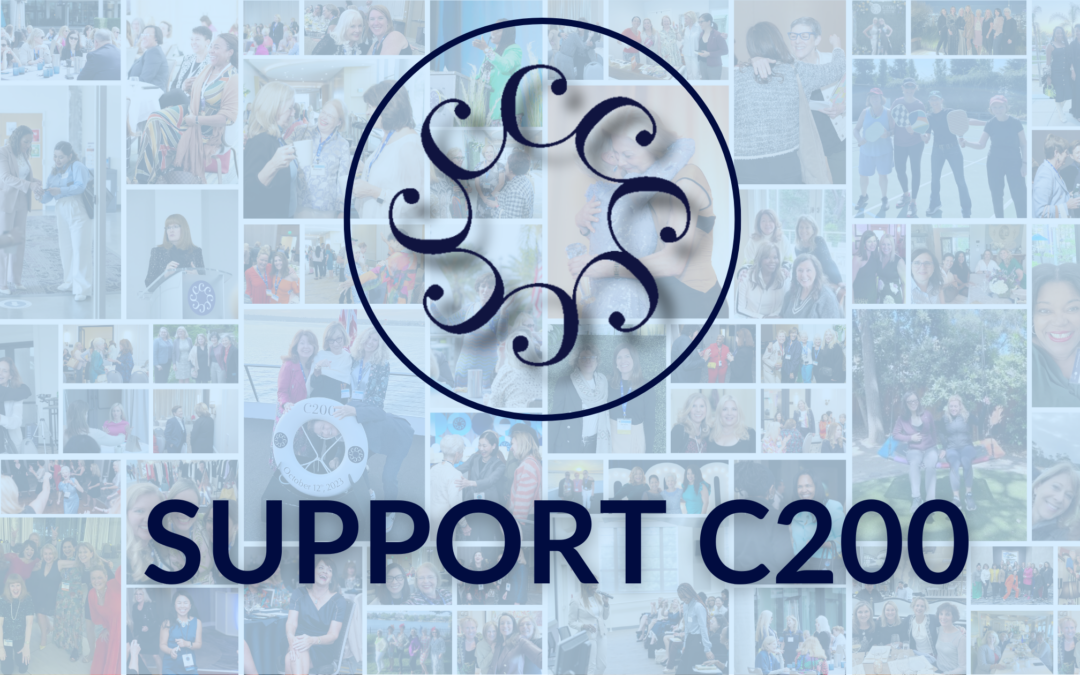
by Eva Glassman | Dec 2, 2024 | Blog, Featured
The march forward to gender parity is always changing.
At C200, the holiday season is one of our favorite times of the year, because it encapsulates the beautiful intersection of celebration, giving, and community—all things that are front and center in our mission is to inspire, celebrate, support, and advance current and future women entrepreneurs and corporate, profit-center leaders.
As we celebrate and cherish our communities during the holiday season, it is also a time to pause and reflect on the year as it comes to an end and a new one begins. What did we accomplish this year? Where did we fall short, and how can we continue to be better? How can we let those we care about know that we love and support them?
As an organization dedicated to empowering women and changing the business landscape, C200 asks these questions year-round, as the march forward to gender parity is always changing.
This year, we’ve continued to see record numbers of women in leadership positions. However, we also know that resources and community for women at the top are scarce; so many women entrepreneurs and executives report feeling lonely and isolated. What’s more, we’ve seen studies come out this year, like McKinsey’s Women in the Workplace 2024 report, warning that companies are deprioritizing the advancement of women and diversity, equity, and inclusion in their strategies, as evidenced by the decline in professional development programs geared toward women and other minority groups.

Women’s networks and ways of achieving success in the current system require something different.
These trends are alarming to us. Businesswomen have unique professional journeys; the resources, community, and support they need to advance are different from what has traditionally worked for men. This is why so many women experience loneliness in the workplace, despite finding great professional success.
It’s clear that even if we do achieve total gender parity in the workplace, that doesn’t mean women will be equally happy or fulfilled in their professional lives. Women’s networks and ways of achieving success in the current system require something different.
Women don’t want to be simply accepted or represented in the workplace; they want to be supported—and be themselves.
Because of this, C200 is leveraging our strengths as one of the first movers for executive women organizations. Founded in 1982, we’re a network for the most successful professional women in the world, and we will continue our work to advance all women in business. We create communities that women need for their distinctive journeys—communities that acknowledge the complexities women face in the workplace and provide the access, intimacy, sisterhood, and bonds that are specific to the careers of women. We are thought leaders, market influencers, and champions of efforts that ensure women are represented, confident, and connected across all aspects of business.
Your financial support of our mission has never been more important.
As we enter the holiday season and this time for celebration, reflection, and giving, C200 is looking toward our members and wider community. In 2025 and beyond, we want to continue to offer the unique and transformative resources and opportunities that have influenced the lives of so many businesswomen over the decades. While our membership dues are critical to the endurance of our mission and efforts, there is so much more we need to accomplish that donations from individuals like you can help us achieve.
With companies scaling back gender parity initiatives and resources for professional women, your financial support of our mission has never been more important. Whether you simply spread the word or donate, please keep C200 in mind this holiday season. Your small donation or word of mouth makes a huge impact on our ability to advance women in business.
Where would any of us be without community? At C200, ours is changing the face of business, one woman at a time.
View C200 Disclosure Statement
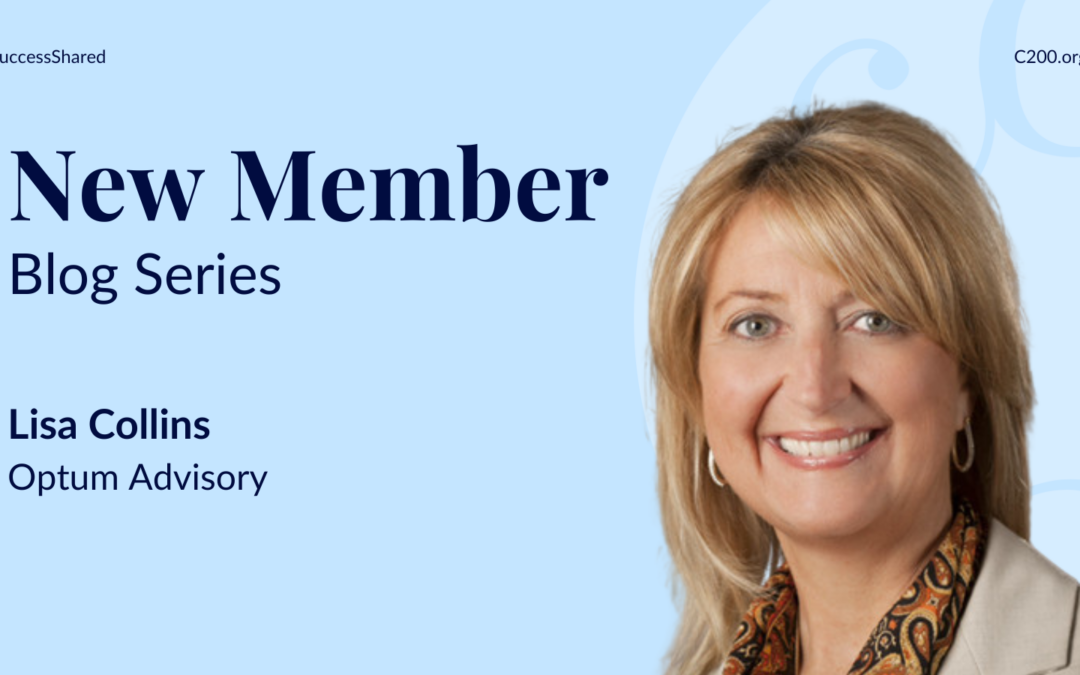
by Eva Glassman | Nov 11, 2024 | Blog, Featured
Lisa Collins is the CEO of Optum Advisory Services, a healthcare consulting firm within United Health Group. With an educational background in industrial engineering and healthcare administration, Lisa began her career in healthcare installing electronic medical record systems (ERMs). Passionate about the opportunities the healthcare space has to help people and evolve, Lisa has remained in healthcare to this day. Outside of work, Lisa enjoys outdoor sports like skiing (both water and snow), dirt biking, and golf, and enjoys family time with her husband and two adult sons. Lisa has been a member of C200 since March 2024.
Eva Glassman: Tell me a little bit about your role at Optum and what the company does.
Lisa Collins: I’m the CEO of Optum Advisory Services. We’re the 4th-largest US-based healthcare-focused consulting firm and sit within the United Health Group organization. We focus on helping payers and providers in the healthcare ecosystem with the challenges they face. For example, we help with setting strategic direction, addressing affordability, and driving efficiencies, along with leading our clients through digital transformation, AI, and automation, with a heavy reliance on data and insights in all we do. Most importantly, we’re always focused on creating outcomes and value for our clients.
EG: What’s your day to day as CEO of Optum?
LC: I attempt to balance my days by focusing on our clients, our talent, and leadership—and, of course, our key business and financial metrics. We continuously drive to meet our targets all while myopically focusing on delivering client value. I’m excited that we had 20% YOY growth last year and expect to achieve that again this year.
EG: What do you love about your job? What’s challenging about it?
LC: Certainly, achieving our key targets and growth rates are incredibly important. However, what I truly love about my job is the impact I make: 1) in helping our clients improve healthcare, and 2) with our people. I have a passion for helping women in leadership and encouraging them to be fearless, curious, and innovative. I’m dedicated in my desire to make sure other women don’t have to go through some of the struggles and glass ceilings I had to go through. I want to break down those barriers when and wherever possible. I hope that will be my legacy and not just: “Hey, she grew the business 20% YOY and hit the targets.”
The most challenging (and exciting) part of what I do is building and enabling a team that solves the difficulties within the healthcare industry—an industry far behind others in many ways. I am committed to incrementally improving the healthcare industry. There is certainly no lack of opportunities, and I will never run out of things to do before I retire!
EG: I’m curious about your educational background and career journey. When you first started your career, was this where you thought you would end up?
LC: I studied Industrial Engineering during my undergrad and have a master’s in healthcare administration. When I graduated college, I started my career at a company called Shared Medical Systems (eventually acquired by Siemens Medical) implementing electronic medical record (EMR) systems at health systems across the country. I fell into that job because it was convenient at the time; it was a mile from my parents’ house, so I was able to take the job, live at home, and save some money for a couple of years. That’s how I got into healthcare, but I feel extremely fortunate that I landed a career where I can truly make an impact to society, clinicians, and patients.
During my tenue at Siemens Medical, I gained experience in consultative and management type roles leading various sales, services, and development organizations. Eventually, I moved from the software side of the business to the medical imagining and laboratory diagnostics side, where I ran services for North America. I certainly gained a deep appreciation for the importance of having discipline around quality, compliance, and regulatory requirements throughout all parts of the business—something that was engrained in me and has helped guide me throughout the duration of my career.
After Siemens I joined Accenture, where I worked for several years running one of the regions within their healthcare space. Another fantastic organization from a culture standpoint, along with their ability to form and deform teams to bring the best to their clients. I left Accenture only due to an opportunity to move over to Cerner to run Global Services, which eventually acquired the Siemens Software business. Having worked with that business for so long, it was a logical transition and, in some ways, felt like going back home.
After Cerner was acquired by Oracle, I decided to join Optum for an opportunity to be the CEO of our Advisory Services organization. I’ve been here for about two years now and absolutely love the culture of United Health Group.
EG: What do you believe are the biggest factors that led to the success of your career?
LC: I had some fantastic mentors along the way, all of whom gave me great advice regarding how to navigate politics, how to intentionally and consistently plan and socialize my career, and how to tell my story to others so that people would feel compelled to sponsor me in my journey.
In addition, I believe my range of business experience contributed to my success and ability to be a good CEO. My overall goal always was to be a CEO. Given that, I consciously sought out experiences that would help me achieve that goal. It was important to have experience with leading R&D, Sales, and Services, and deep understanding of managing large P&L’s. I intentionally changed roles so that, by the time I could become CEO, I had the full breadth and depth of what was required. I knew where I wanted to go, what I wanted to be, and made sure that I was getting professional experience that was required of me to rise up the ranks.
EG: I want to go back to what you were saying about mentors. Did you have any women mentors over the course of your career?
LC: Early on, my mentors were mostly men, mostly because there weren’t many women in executive roles at the time. In the last ten years, I’ve gained more and more mentors who are women—in fact, now they’re mostly all women!
To be honest, I don’t know if I’d even call them mentors at this point; we are all part of a “squad” that helps each other. I’m always trying to bring more women into our squad. Right now, there are ten or twelve women executives that I rely on heavily and we depend on each other for problem solving and general support.
Over the years, my view of “mentorship” has evolved from “true,” formalized mentorship to just a group of us that bring together different skills and talents. We certainly mentor and bring positive energy to each other.
EG: I love hearing how your idea of what mentorship looks like has changed—less formal and more human. It sounds like you’ve created a positive environment for yourself and for other women in your network. I know that many women, even if there were other women in their industry, didn’t feel looked after as they advanced through the ranks.
LC: I remember being in meetings where I was literally the only woman executive in the room—thank goodness it’s not like that at all anymore.
I’m one hundred percent about bringing women along. In my late 30s, early 40s, there was a shift in my mindset when I stopped and thought, “Okay, I’m confident where I’m going—but what am I doing to bring others along?” I also started thinking more about the gaps in my own skills and how to build diverse teams around me to fill those gaps.
I don’t understand leaders who create teams by hiring people who are exactly like them. What does that do for you, truly? I want a team that is comfortable to challenge and question each other, including me—this is what creates innovation and solutions. We limit the art of the possible if we don’t question and push each other!
EG: More to your point, the shift to more human-centric leadership within professional environments is good for innovation, and lots of women are the leaders for that approach.
LC: There was a day in the workplace when you couldn’t show who you were as a woman, whether it be any emotional sensitivity or just talking about kids (whether it be because you had them or wanted them). This is still a consequence for many working women today—it’s ridiculous. As much as I love my career, it’s still a means to an end; my family is what’s most important to me. At the end of the day, the company will go on without me, which is not a bad thing to admit.
EG: What does being a woman in business mean to you, if anything? How do you apply that thinking to what you do?
LC: Again, it’s about bringing a diversity of strengths to a single team. In general, women tend to be good connectors and more in touch with their emotional intelligence, which is critically important as a leader. It is possible to hold each other accountable, be strategic and innovative, and have humility and grace in the workplace.
I’m not into a hierarchical workplace culture. Recognizing and expressing gratitude for your hardworking team goes a long way, and it’s important to do it for all levels across the team; we’re all in the same boat together, driving forward. I encourage folks to bring forward ideas, whether they are an intern or SVP; even if the idea is a little off, it may spark something great.
I don’t know if any of this has to do with being a woman, but it’s what’s important about being a strong leader.
EG: Outside of work, what do you like to do for fun?
LC: Work hard, play hard! I’m a very active, outdoorsy person. I’m all about dirt bikes, wave runners, skiing—snow and water. I run and weightlift every day. Lately, I’ve had a bit more time on the weekends to golf—something I’ve always loved to do, but really enjoying having more time for right now.
And then, of course, I love to spend time with my husband and two sons. My kids are grown and have their own lives, but we still meet up for dinner and go on vacations as a family as often as possible.
As a boy mom, it’s always been interesting figuring out how to stay connected with my sons. I was always a bit of a tomboy, though, and had a dirt bike since I was twelve (and still have my first one—a Honda XL75). When my sons were young, I introduced them to all the outdoorsy activities I’ve always enjoyed, and we’ve bonded through them over the years.
EG: What is your advice to aspiring women business leaders to advance their careers?
LC: Network, network, network! I’m sure you’ve heard that a million times—but it’s still true. It’s important to have strong networks in the space where you spend a good portion of your time. That’s why I love C200; it’s another opportunity to forge strong networks with amazing women across other industries. It will be really interesting for me to learn from C200 members and bring my learnings back to the healthcare space.
It’s important to consciously work at it, to the point where I put it in my calendar to reach out to someone. Regardless of how you network—on LinkedIn, emails, social media, or grabbing a coffee—the key is to put in the effort, because the return can be significant.
EG: Basically, network before you need to.
LC: Exactly. You have to give in order to get in return. Even getting involved in your local community can be so beneficial—you never know who you’ll meet with and develop a connection. For example, I’m on the board for the Penn Medicine Chester County Hospital and involved with Community Volunteers in Medicine. It’s helpful to think about networking as opportunities to help others.
Of course, there’s a lot you can do within your company to advance your career, too. Be the one who raises your hand, and step up if you have an idea. If you can jump on an opportunity that can get you recognized and differentiated within the company, people will see what’s different about what you bring to the table. Bottom line: be fearless!

